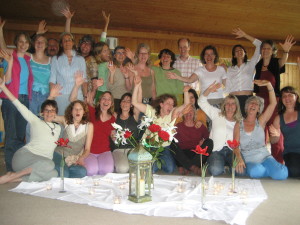Professional Training Program
Today there are many schools of body-centered psychotherapy. The key to healing is to draw from a variety of modalities and to know what the best balance is at any one time. A skilled therapist understands the dynamics of attachment and bonding, how to form healthy relationships, how to resolve trauma and shock, when multi-generational patterns are lurking beneath the surface and, perhaps most importantly, how to work with a model of empowerment and presence. Healing is about finding the magical balance at each point in a session. Integrative Somatic Psychotherapy, ISP, is a comprehensive body-centered approach that integrates the best work in the field.
 In the first year, a solid foundation is built of body-centered skills. The learning is from the inside out so there is a potent balance of theoretical knowledge and personal process. A cornerstone is on attachment and bonding and on how to be whole and empowered in relationship. By tracking the energy in the body, on a moment-to-moment basis, students learn the skills for healthy self-regulation and dynamic attunement.
In the first year, a solid foundation is built of body-centered skills. The learning is from the inside out so there is a potent balance of theoretical knowledge and personal process. A cornerstone is on attachment and bonding and on how to be whole and empowered in relationship. By tracking the energy in the body, on a moment-to-moment basis, students learn the skills for healthy self-regulation and dynamic attunement.
In the next modules, students learn to track different character styles in the body and different interventions and transference issues for each style. Relationship dynamics are traced back to multi-generational family patterns. Then more ground work is laid for treating trauma and shock. For trauma to safely unwind, a slower tempo and different skills are called for. In an ISP session, a client’s system can freely breathe on all of these levels.
In the second year, students use these clinical skills to travel back to the prenatal and birth time periods. By understanding these embryological origins, students learn to track presence, health and trauma in the energy fields, fluids, organs, muscles and bones. It is here, for instance, that early relationship patterns are learned in the body tissue. It is also here that an open heart and connection to spirit are close at hand. By understanding this body-mind interface, with a greater level of detail, a therapist learns powerful skills for working with all of life’s issues. In the last two modules, the emphasis is on integrating these somatic skills with adult counseling and marital therapy techniques.
While the training is geared towards psychotherapists, it is also a powerful healing journey. It is not necessary to be a psychotherapist to take the training, but a background in healing is required. Empowerment, healthy boundaries, self-regulation, deeper body awareness, meaningful relationships, clarity, wisdom, and skillful means, are themes that run throughout.
Class Descriptions Price and Logistics Calendar Articles